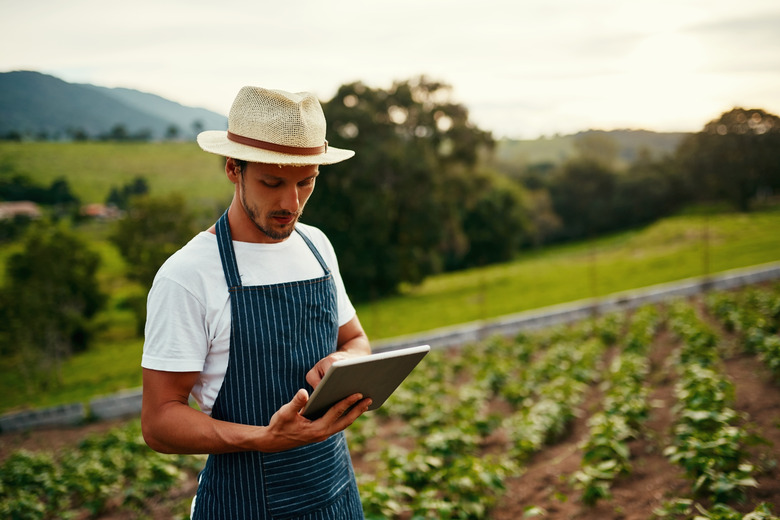How Sustainable Farming Might Just Save The World
An increasing global population, changing dietary habits and climate change all affect the environmental around us – and the agricultural sector needs to adapt to meet these rising challenges. Farmers and scientists worldwide are working toward a common goal: sustainable farming.
At its core, sustainable farming means raising crops and livestock in a way that's humane: for animals, for the human communities involved in farming and for the planet. Each day, scientists make more discoveries that bring the goal of worldwide sustainable farming closer to a reality than ever. A few recent advances in sustainable farming have improved our ability to conserve resources while farming, and your dietary habits and choices can help lower greenhouse gas emissions.
Communication Between Soil and Plants Could Boost Productivity
Communication Between Soil and Plants Could Boost Productivity
Helping our crops do more with less is key for more efficient agriculture, and microbes might hold the key to more sustainable crops. Just like your digestive tract is full of helpful microbes that promote good gut health, plants nurture a community of microbes on their roots. And plants may actually change their microbiome as they grow, researchers from the Lawrence Berkeley National Laboratory in California found.
The research group studied the relationship between a common grass and microbes by collecting samples from the soil as the grass grew, and seeing which microbes thrived or declined. Analyzing the results, they found that grass released compounds that helped "friendly" microbes and hindered unfriendly ones – in other words, the grass created a microbiome that supported its growth.
While this research is still new, understanding more about how soil microbes and plants interact could help farmers create soil more closely tailored for certain crops, allowing the plants to be more productive.
Crops Genetically Engineered to Need Less Water
Crops Genetically Engineered to Need Less Water
Genetic engineering and genetically modified organisms (GMOs) have somewhat of a bad reputation, but they can be a great asset in the fight against global warming. Take GMO crops developed at the University of Illinois at Urbana-Champaign. A modification that altered the expression of a single gene (called PsbS) reduces the amount of water plants lose via their stroma. The mutation helps plants use water 25 percent more efficiently, so they can produce the same yield with less water.
While its use in agriculture remains to be seen, genetic modifications like this could make plant crops more sustainable by reducing their water needs. The modification could also help plants produce food in drier climates.
Get Sustainable Seafood by Changing the Fishes' Diets
Get Sustainable Seafood by Changing the Fishes' Diets
Cattle production often takes the most heat (pun intended) for contributing to climate change, but farmed seafood, sometimes called aquaculture, has a significant impact on the environment, too. Because we mostly eat larger fish that inhabit the top of the food chain (think salmon, tuna and tilapia), farmed fish are often fed a lot of smaller fish, which may be wild foraging fish, before they're ready to harvest. Research from the University of Washington, published in 2018, notes that these forage fish will be overextended by 2050 or sooner, which could permanently change aquatic ecosystems, as well as threaten the seafood industry.
The thing is, those fish don't really need to feed on wild fish to grow, and we need to explore more sustainable options. For example, researchers from Swansea University have found that seagrass meadows play a key role in supporting the world's biggest fisheries. So further research and environmental policy that study and protect these seagrass meadows could lead to more sustainable aquaculture.
Smart Dietary Choices Can Shape a Better Future
Smart Dietary Choices Can Shape a Better Future
If you want to help fight climate change, you can do your part by shopping smart at the grocery store. Research from Tufts University, published in "Food Policy" in June 2018, reports that red meat production releases the largest proportion of the industry's greenhouse gas emissions, at 21 percent. Fresh vegetables and melons contributed 11 percent of the industry's greenhouse gas emissions. You can keep your shopping more environmentally friendly by crafting most of your meals from plants (for example, using red meat as a garnish rather than as a main course). Shop with a grocery list to avoid buying too much food, and look for seasonal and locally grown produce and livestock to keep your groceries relatively eco-friendly.
References
- ScienceDaily: Scientists Engineer Crops to Conserve Water, Resist Drought
- ScienceDaily: Key Ocean Fish Can Prevail With Changes to Farmed Fish, Livestock Diets
- ScienceDaily: World's Biggest Fisheries Supported by Seagrass Meadows
- ScienceDaily: Plants Really Do Feed Their Friends
- ScienceDaily: Consumer Food Choices Can Help Reduce Greenhouse Emissions Contributing to Climate Change
Cite This Article
MLA
Tremblay, Sylvie. "How Sustainable Farming Might Just Save The World" sciencing.com, https://www.sciencing.com/how-sustainable-farming-might-just-save-the-world-13711550/. 25 June 2018.
APA
Tremblay, Sylvie. (2018, June 25). How Sustainable Farming Might Just Save The World. sciencing.com. Retrieved from https://www.sciencing.com/how-sustainable-farming-might-just-save-the-world-13711550/
Chicago
Tremblay, Sylvie. How Sustainable Farming Might Just Save The World last modified March 24, 2022. https://www.sciencing.com/how-sustainable-farming-might-just-save-the-world-13711550/
